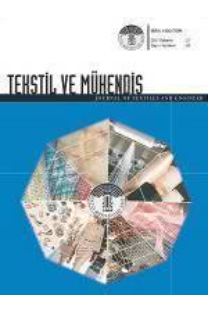SICAKLIĞA DUYARLI DERİLERİN YAŞLANMA DAVRANIŞLARI
AGEING BEHAVIOR OF TEMPERATURE SENSITIVE LEATHERS
___
- 1. Şeren, A., Adıgüzel Zengin, A. C., Bitlisli, B. O., (2013), Thermochromic Pigments in Leather Finishing, XXXII Congress of IULTCS, 29-31 May 2013, Istanbul, Turkey, 34.
- 2. Salom A., Adiguzel Zengin A.C., Bitlisli B.O., (2016), Temperature Sensitive Colour Changing Leathers with Thermochromic Pigments, Journal of Society of Leather Technologists and Chemists, 100, 6, 314-320.
- 3. Bamfield, P., Hutchings, M., (2010), Chromic Phenomena Technological Applications of Colour Chemistry, 2nd ed. Royal Society of Chemistry, Cambridge, Great Britain, 562.
- 4. Adiguzel Zengin, A.C., Kucukakin, E., Bitlisli, B.O., (2017), Ageing Behavior of Temperature Sensitive Leathers, 16th International the Recent Progress Symposium on Textile Technology and Chemistry, 4-6th May 2017, Bursa, Turkey, 313- 320.
- 5. Christie, R.M., Robertson S., Taylor, S., (2007), Design Concepts for a Temperature Sensitive Environment using Thermochromic Color Change, Color: Design and Creativity, 1, 1, 1-11.
- 6. Kulcar, R., Friskovec, M., Hauptman, N., Vesel A., Gunde, MK., (2010), Colorimetric properties of reversible thermochromic printing inks, Dyes and Pigments, 86, 271-277.
- 7. Chowdhury, M.A., Joshi, M., Butola, B.S., (2014), Photochromic and Thermochromic Colorants in Textile Applications, Journal of Engineered Fibers and Fabrics, 9, 107-123.
- 8. Mather, R.R., (2001), Intelligent Textiles, Rev. Prog. Color., 31, 36- 41.
- 9. Gulumser, T., Karagöz, E., Kumbasar Akçakoca, E. P., (2008), Research about Dyeing of Cotton Fibers with Fluorescent Dyestuffs and Developing Light Fastness, Tekstil ve Konfeksiyon, 4, 284-288.
- 10. Brezova, V., Pigosova, J., Havlinova, B., Dvoranova, D., Durovic, M., (2004), EPR study of photochemical transformations of triarylmethane dyes, Dyes and Pigments, 61, 177-198.
- 11. Basaran, B., Bitlisli, B.O., Ocak, B., Onem, E., (2011), Effect of Different Atmospheric Conditions on Some Physical Properties of Leather, Tekstil ve Konfeksiyon, 2, 194-198.
- 12. Oda, H., (2008), Photostabilization of Organic Thermochromic Pigments: Action of Benzotriazole Type UV absorbers Bearing an Amphoteric Counter-Ion Moiety on the Light Fastness of Color Formers, Dyes and Pigments, 76, 1, 270-276.
- 13. Lopes, F., Neves, J., Campos, A., Hrdina, R., (2009), Wearing of Microencapsulated Thermochromic Pigments, Research Journal of Textile and Apparel, 13, 1, 78-89.
- 14. Christie, RM., Bryant, ID., (2005), An evaluation of thermochromic prints based on microencapsulated liquid crystals using variable temperature color measurement, Coloration Technology, 121, 187- 192.
- 15. Chowdhury, M. A., Butola, B. S. and Joshi, M., (2013), Application of thermochromic colorants on textiles: temperature dependence of colorimetric properties, Coloration Technology, 129, 232-237.
- 16. Tamilmani, V., Kanadasan, D., Muthazhagan, R., Sreeram, K.J., Raghava Rao, J., Nair, B.U., (2015), Thermochromism for Smart Leathers, Journal of American Leather Chemists Association, 110, 6, 161-164.
- 17. ISO 2418, (2002), Leather -- Chemical, physical and mechanical and fastness tests -- Sampling location, International Organizationfor Standardization (ISO), Geneva, Switzerland.
- 18. ISO 2419, (2012), Leather-Physical and mechanical tests-Sample preparation and conditioning, International Organization for Standardization (ISO), Geneva, Switzerland.
- 19. TS EN ISO 17228, (2009), Leather-Tests for colour fastnessChange in color with accelerated ageing, Turkish Standard Institute, Ankara, Turkey.
- 20. McLaren, K., (1983), The color science of dyes and pigments, Adam Hilger Ltd. Bristol, UK, 186.
- 21. Mutlu, M.M., Crudu, M., Maier, S.S., Deselnicu, D., Albu, L., Gülümser, G., Bitlisli, B.O., Başaran, B., Tosun, C.C., Adıgüzel Zengin A.C., (2014), Eco-Leather: Properties of Chromium-Free Leathers Produced with Titanium Tanning Materials Obtained from the Wastes of Metal Industry, Ekoloji, 23, 91, 83-90.
- ISSN: 1300-7599
- Yayın Aralığı: 4
- Başlangıç: 1987
- Yayıncı: TMMOB Tekstil Mühendisleri Odası
Türkiye’deki Büyük Beden Kadın Giyimindeki Problemleri Belirlemeye Yönelik Anket Çalışması
Basak SULLER ZOR, Arzu VURUŞKAN
KAPLAMANIN KORUYUCU ELDİVENLERİN PERFORMANS ÖZELLİKLERİNE ETKİSİ
Hava Jetli İpliklerin Dokuma Kumaş Performanslarının Değerlendirilmesi
Hüseyin Gazi TÜRKSOY, Tuğba AKKAYA, Sümeyye ÜSTÜNTAĞ
Farklı Eğirme Sistemleriyle Üretilmiş Bobinlerin Renk Değerlerinin Karşılaştırılması
Halil ÖZDEMİR, R.Tuğrul OĞULATA
HAVA JETLİ İPLİKLERİN DOKUMA KUMAŞ PERFORMANSLARININ DEĞERLENDİRİLMESİ
